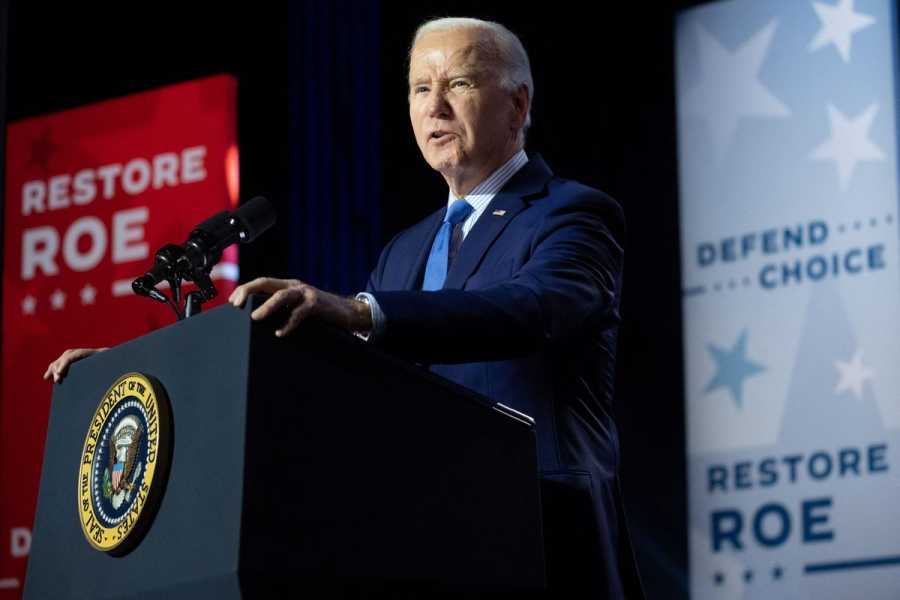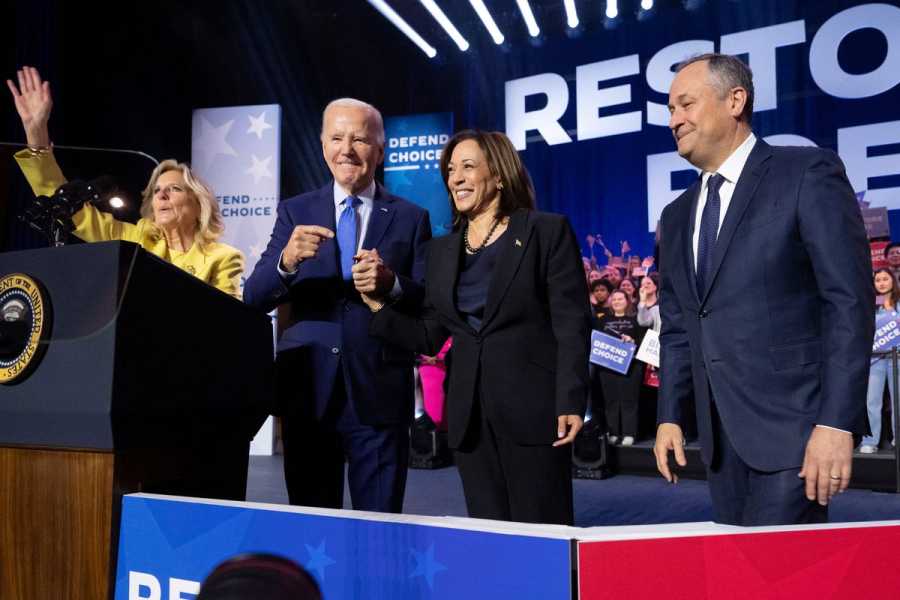Many reproductive health organizations want to codify stronger standards. They’re not going to pick that fight this year.

President Joe Biden speaks during a campaign rally to restore Roe at Hylton Performing Arts Center in Manassas, Virginia, on January 23, 2024. Saul Loeb/AFP via Getty Images Rachel M. Cohen is a senior reporter for Vox covering social policy. She focuses on housing, schools, labor, criminal justice, and abortion rights, and has been reporting on these issues for more than a decade.
When Joe Biden and Kamala Harris held their first joint campaign event of 2024 last month in northern Virginia, they left no doubt that codifying abortion rights would be central to the president’s reelection bid. With the rally timed to honor what would have been the 51st anniversary of Roe v. Wade, Biden stood under a large “Restore Roe” sign and beside supporters holding smaller posters to “Defend Choice.”
“We need the protections of Roe v. Wade in every state. And we can do it. You can do it,” Biden stressed at the event. “Give me a Democratic House of Representatives and give me a bigger — a bigger Democratic Senate, and we will pass a new law restoring the protections of Roe v. Wade, and I will sign it immediately.”

First lady Jill Biden, President Joe Biden, Vice President Kamala Harris, and her husband Doug Emhoff wave following a campaign rally to restore Roe at Hylton Performing Arts Center in Manassas, Virginia, on January 23, 2024. Saul Loeb/AFP via Getty Images
In subsequent campaign blasts, the Biden-Harris team reiterated the Roe message. “A vote for Joe Biden and Kamala Harris is a vote to restore Roe,” said Julie Chávez Rodriguez, Biden’s campaign manager. “It’s simple,” the president tweeted to his nearly 34 million followers, under a graphic calling to “Restore the Protections of Roe v. Wade Once and For All.”
After the 2022 and 2023 election cycles, it may not be surprising that Biden is running on an abortion rights platform. What’s new, though, is that prominent abortion rights groups are biting their tongues about Roe and “pro-choice” messaging they disdain and have been trying to steer politicians away from.
In the weeks and months following the June 2022 Dobbs v. Jackson decision, it was more common to hear influential leaders within the abortion rights movement talk about the necessity of going beyond Roe v. Wade, not going back to it. The old legal standard, they argued, was never good enough, and left too many people without access to the reproductive healthcare they needed.
When a bipartisan group of lawmakers introduced a bill in summer 2022 to codify the legal protections that existed under Roe just before the Dobbs decision was issued, a coalition of reproductive rights groups came out quickly against it. Activists instead had their eyes set on the Women’s Health Protection Act, a more sweeping federal bill that would not only restore the pre-Dobbs status quo but also ban most state-level restrictions as well as religious exemptions for health care providers. (WHPA passed the House in 2021 but failed twice in the Senate.)
The groups’ opposition to anything incremental meant a more moderate, compromise effort to protect abortion rights in Congress was never seriously attempted after Roe.
The hope to go beyond Roe hasn’t disappeared. Bolstered by decisive ballot measures to protect abortion rights over the last 18 months, election wins for Democrats who campaigned heavily on reproductive freedom, and surveys that suggest voters have grown even more supportive of abortion rights since Roe’s repeal, many activists have pressed Democrats to avoid using “Roe” language at all, and even steer clear of popular “pro-choice” messaging they believe helped normalize restricting abortion over the years.
Yet with the 2024 election now closer and stakes on abortion access even higher, reproductive rights groups have decided to swallow their concerns and enthusiastically endorse the president’s reelection strategy. Vox reached out to a dozen abortion rights groups, and while many offered statements about the need to do more to protect abortion access, no organization went so far as to say they disagreed with the president on his call to restore Roe, or explicitly object to his language.
Most groups handled the tension by saying they supported codifying “real protections” that restore the “original promise” of Roe — even if the restoration of Roe could mean restoring the legal rights available before Dobbs.
“Planned Parenthood Action Fund’s long-term vision includes short-term strategies, and it’s very simple,” Alexis McGill Johnson, the president and CEO of Planned Parenthood Action Fund, told Vox. “This November, voters will have to decide between an administration that continues to work with us in the fight for freedom or an administration that caused our current public health crisis and will go further with a national abortion ban. We have a very clear choice between holding the line or descending further into what will be irreparable chaos and confusion.”
Planned Parenthood endorsed Biden’s reelection bid last June and recently published a glowing review of the administration’s record on abortion access. “You can be certain that we are fighting for more than Roe v. Wade,” McGill Johnson told me.
“We absolutely need to restore the protections of Roe v. Wade, and so much more,” said Katie O’Connor, the National Women’s Law Center’s director of federal abortion policy. “We are proud to have endorsed President Biden, and pleased he has committed to signing a bill that would lock the federal right to abortion into law,” Mini Timmaraju, president and CEO of Reproductive Freedom for All, added.
“Restore Roe” is Biden’s politics, not his policy
Biden’s campaign and surrogates are quick to point out that the president has already taken steps to protect abortion rights that go beyond the standards of Roe v. Wade. He’s on record supporting the Women’s Health Protection Act, and his administration has expanded access to abortion pills via telemedicine and at pharmacies.
So abortion rights groups and their congressional allies looking to pass stronger protections have decided to tolerate the president’s Roe messaging, trusting his team will do more if reelected, despite what he’s saying publicly now to voters.
“I support President Biden’s campaign message to restore Roe and his administration’s actions to defend abortion access,” Democratic Sen. Elizabeth Warren told me, drawing a distinction between his campaign rhetoric and his executive policies.
Whether voters know that “restoring Roe” is not the president’s end goal for abortion policy, though, is less clear. He’s never specifically articulated that fact, and his surrogates are wary to do so on the record, either. They suggest, rather, that a person should be able to infer the president’s policy goals based on a close reading of his administration’s record.
The Biden campaign, for its part, wants to keep the conversation stationed on friendly political ground — where codifying or restoring Roe simply means legalizing or protecting abortion rights. This is safer territory, since most Americans believe abortion should be legal in all or most cases and that overturning Roe v. Wade was a mistake. However, when one starts drilling down into the details about specific limits or restrictions, public opinion becomes murkier and more complex.
Where things get tricky is that Biden has not just praised Roe as a shorthand for legal abortion rights. He also continues to praise the specifics of the Supreme Court decision itself.
“It was a decision on a complex matter that drew a careful balance between a woman’s right to choose earlier in her pregnancy and the state’s ability to regulate later in her pregnancy,” the president said when the Dobbs ruling came down. “A decision with broad national consensus that most Americans of faiths and backgrounds found acceptable.”
Even at this recent Virginia campaign event in January the president went so far as to say, “I believe Roe v. Wade got it right, and so do a majority of Americans.”
This tendency to try and have it both ways on Roe has been frustrating for anti-abortion groups, as they point out the administration will praise the Supreme Court decision that endorsed limits and regulations but won’t say today which, if any, limits they’d now support.
For example, last fall, when Harris was asked if there should be any limits on the right to an abortion, said at least five times that “we need to restore the protections of Roe v. Wade” but dodged clarifying what she meant by that in practice.
Some Democratic political strategists say this waffling is simply necessary to get through November, to avoid Republicans spreading the lie that third-trimester abortions will become more common if Biden is reelected. Recently the Republican National Committee claimed in a press release that Biden supports “abortion-on-demand up until the moment of birth and after.”
The GOP also tried to attack Democrats in Virginia for supporting abortion “up until birth” in the recent 2023 election cycle, but voters didn’t seem to buy it. While Americans do tend to be more uncomfortable with third-trimester abortions, they also seem to understand they are extremely rare, and are typically associated with fetal anomalies, threats to a mother’s life, and barriers to care that delay access to the procedure.
Abortion rights groups still plan to push for more than Roe
As of now, the two major bills to codify abortion rights on the federal level are the Women’s Health Protection Act and the Reproductive Freedom for All Act, which would legalize abortion before fetal viability and permit so-called conscience protections for health care providers who oppose abortion.
When I asked a dozen abortion rights groups if they’d support codifying reproductive rights in legislation if the proposed federal bill did not go as far as the Women’s Health Protection Act, most organizations demurred or declined to answer directly. Only Catholics for Choice offered a clear affirmative statement that they’d be willing to consider any bill that allows a pregnant person to choose abortion. “This is not a time to make good legislation the enemy of the perfect,” president Jamie Manson told me.
A spokesperson for Democratic Sen. Tim Kaine, one of the lead sponsors of the Reproductive Freedom for All Act, told Vox that he remains focused on passing his bill to codify “the essential holdings of Roe and related cases to protect reproductive freedom and access to contraception.” In a press interview following Biden’s Virginia campaign event, Kaine stressed his bill is the only bipartisan one pending in Congress now to restore Roe as a statutory protection.
Despite his campaign mantra to restore Roe, the Biden campaign declined to comment on whether the president would sign the Reproductive Freedom for All Act if it passed Congress.
Democratic Sen. Tina Smith suggested lawmakers would be open to different pieces of legislation to protect abortion rights. “Our goal is to restore women’s reproductive freedoms,” she told me. “If that’s the Women’s Health Protection Act or something else remains to be seen, but that’s where I stand.”
Sourse: vox.com